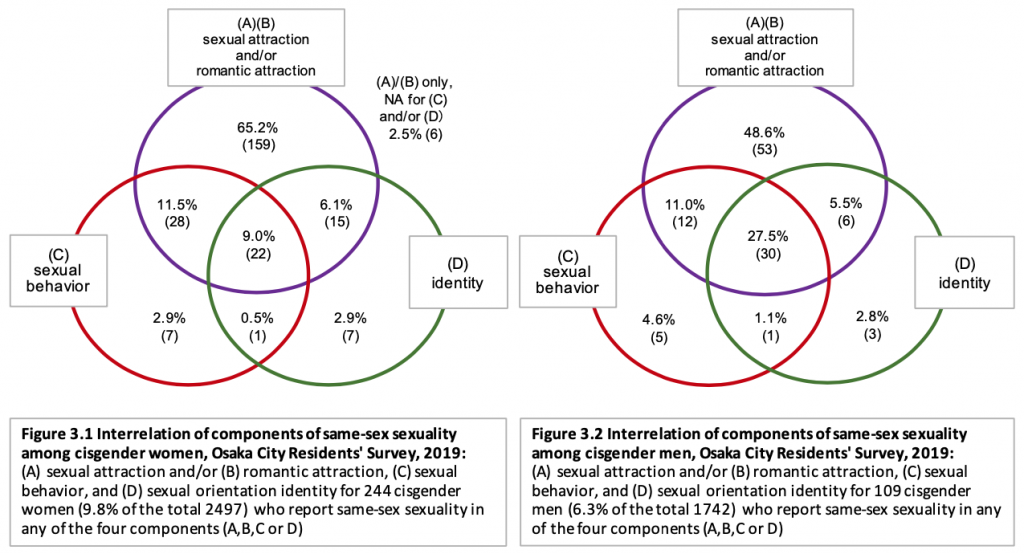“It is a capital mistake to theorize before one has data. Insensibly one begins to twist facts to suit theories, instead of theories to suit facts.”
—Arthur Conan Doyle, “A Scandal in Bohemia” in The Adventures of Sherlock Holmes
I use quantitative methods to study stratification and inequality based on sexuality and gender as well as sexual and gender minority populations from a queer and feminist perspective. In particular, I am interested in (1) the association between sexual orientation and gender identity, and socioeconomic status; (2) the measurement of sexual orientation and gender identity in quantitative research; (3) sexual/gender minorities and social attitudes; and (4) queer and feminist methodologies.
For a complete list of publications and research experience, please see my CV here.
Data Collection Experience
Due to the scarcity of data on sexual orientation and gender identity in Japan, I have engaged in primary data collection for my research and designed multiple, large-scale social surveys. I hold the Certificate of Advanced Social Researcher issued by the Japanese Association for Social Research. Below is a list of the major surveys that I have been involved in:
- The “National Survey of Family, Gender/Sexuality, and Diversity” (one of the few nationally representative surveys with questions on sexual orientation and gender identity in Japan, conducted in February-March 2023)
- Constructing a Demography of Sexual Orientation and Gender and Identity: Nationwide Random Sampling Survey (JSPS KAKENHI Grant Number 21H04407, PI: Saori Kamano, $409,500)
- Kamano, Saori, Takeyoshi Iwamoto, Yasuyo Koyama, Jiyeon Shin, Kyoko Takeuchi, Yoshimi Chitose, Daiki Hiramori, Hiromi Fujii, Kana Fuse, and Masakazu Yamauchi. 2024. “Summary Report of the National Survey of Family, Gender/Sexuality, and Diversity.” Translated by Kairi Shimabukuro. Journal of Population Problems 80(1):119-53.
- The “niji VOICE” surveys (a series of web surveys of LGBTQ work and life in Japan, conducted almost annually since 2014 by the certified nonprofit organization Nijiiro Diversity)
- Muraki, Maki, Daiki Hiramori, Jun Mikami, and Kei Yamawaki. 2024. niji VOICE 2023 Report: A Survey of LGBTQ+ Work and Life in Japan, edited by the certified nonprofit organization Nijiiro Diversity. Osaka, Japan. Translated by Taylor Hamilton.
- Certified Nonprofit Organization Nijiiro Diversity, Daiki Hiramori, Jun Mikami, and Kei Yamawaki. 2023. niji VOICE 2022: A Survey on LGBTQ Work and Life [MRDF]. Osaka, Japan: Certified Nonprofit Organization Nijiiro Diversity [producer/depositor]. Tokyo, Japan: Center for Social Research and Data Archives, Institute of Social Science, The University of Tokyo [distributor].
- The second “Survey on Ideas about Being Men and Women and Social Attitudes” (one of the few nationally representative surveys of attitudes toward various sexual and gender minorities in Japan, conducted in June-July 2019)
- Research on the Transformation of Attitudes and Policy toward Sexual Minorities (JSPS KAKENHI Grant Number 18H03652, PI: Kazuya Kawaguchi, $430,300)
Sexual/Gender Minorities and Socioeconomic Inequality
In this project, I examine inequality in socioeconomic status based on sexual orientation and gender identity in Japan. In my dissertation “Sexuality Stratification in Contemporary Japan: A Study in Sociology,” I used the Osaka City Residents’ Survey, one of the few population-based surveys that asks about sexual orientation in Japan, to explore the association between sexual orientation and educational attainment, occupational segregation, and earnings disparities in Japan. The research for this dissertation was partially supported by the Harry Bridges Center for Labor Studies at the University of Washington, Japan Center for Economic Research, and JSPS KAKENHI Grant Number JP16H03709 “Demography of Sexual Orientation and Gender Identity: Building a Foundation for Research in Japan.”
- Hiramori, Daiki. Forthcoming. “Social Stratification: Stratification and Inequality Based on SOGI.” Pp. XX-XX in LGBT/SOGI and Society, edited by T. Iwamoto and S. Kamano. Kyoto, Japan: Minerva Shobo. In Japanese.
- Hiramori, Daiki. 2015. “Challenges of Sexual and Gender Minorities in the Workplace: Multivariate Analyses of Income and Willingness to Continue Working.” Gender and Sexuality 10:91-118. In Japanese.
- Hiramori, Daiki. “Social-Institutional Structures That Matter: A Quantitative Monograph of Sexual/Gender Minority Status and Earnings in Japan.” Working paper available on SocArXiv.
Demography of Sexual Orientation and Gender Identity
I am involved in the research project “Constructing a Demography of Sexual Orientation and Gender Identity: Nationwide Random Sampling Survey” to examine how to quantitatively understand sexual and gender minority populations while taking the Japanese context into account. I am also interested in describing the diversity of sexual and romantic orientations from a demographic perspective.
- Hiramori, Daiki, and Saori Kamano. Forthcoming. “Understanding Sexual Orientation Identity, Sexual/Romantic Attraction, and Sexual Behavior beyond Western Societies: The Case of Japan.” Pp. XX-XX in International Handbook on the Demography of Sexuality, edited by A. K. Baumle and Z. O. Tuthill. 2nd ed. Dordrecht, Netherlands: Springer. Working paper available on SocArXiv.
- Miyake, Daijiro, and Daiki Hiramori. 2023. “Multidimensionality of Romantic Orientation among the Aromantic/Asexual Spectrum in Japan.” Gender and Sexuality 18:1-25. In Japanese.
- Miyake, Daijiro, and Daiki Hiramori. 2021. “Demographic Diversity of the Aromantic/Asexual Spectrum in Japan: Findings from the 2020 Aro/Ace Survey.” Journal of Population Problems 77(2):206-32. In Japanese.
- Hiramori, Daiki, and Saori Kamano. 2020. “Asking about Sexual Orientation and Gender Identity in Social Surveys in Japan: Findings from the Osaka City Residents’ Survey and Related Preparatory Studies.” Journal of Population Problems 76(4):443-66. *A full Japanese translation of this article is available in the Journal of Population Problems 77(1):45-67.
Attitudes toward Sexual/Gender Minorities
Originally started as senior thesis research on attitudes toward same-sex sexual relations, this project investigates the factors associated with attitudes toward sexual/gender minorities in Japan, with a focus on the Buddhist faith.
- Hiramori, Daiki. 2019. “Is Buddhism Tolerant of Homosexuality in Japan? Toward a Contextual Understanding of Religion and Homosexuality.” Presented at the Annual Meeting of the American Sociological Association, August 10, New York, NY.
Quantitative Queer Methodology
In this project, I explore the possibility of using quantitative methods from a queer perspective. Drawing from emerging literature on queer approaches to quantitative data collection and analysis, this project aims to illustrate how quantitative research may be used to empirically evaluate the claims of queer theory and how queer theory, in turn, may be used to inform quantitative research.
- Hiramori, Daiki. 2024. “Queer Demography in Japan: Decentering Universalized Knowledge of Gender and Sexuality in the West.” Presented at Tokyo College, The University of Tokyo Institutes for Advanced Study, October 24, Tokyo, Japan.
Other Research and Program Evaluation Experience
In addition to the projects mentioned above, I have been involved in various research projects related to gender and sexuality. Between March 2017 and March 2022, I also worked at the Center for Evaluation & Research for STEM Equity at the University of Washington as a graduate research assistant. My evaluation style centers on the perspective of diversity, equity, and inclusion for a more equitable representation of systemically marginalized populations in science, technology, engineering, and mathematics (STEM) educational fields.
- Iwamoto, Takeyoshi, Daiki Hiramori, Shino Naito, and Satoshi Nakano. 2019. “An Estimation of Social Loss Due to Suicide and Depression among Sexual/Gender Minorities, and a Survey on Income Disparity between Them and the Non-Minority.” The Japan Institute for Labour Policy and Training, JILPT Discussion Paper 19-05. In Japanese.
- Internal Evaluator (Social Science Researcher: March 2019-) for the Pacific Northwest Louis Stokes Alliance for Minority Participation, Center for Evaluation & Research for STEM Equity, University of Washington.
- 2019-2025. Louis Stokes STEM Pathways and Research Alliance: Pacific Northwest. Division of Human Resource Development, National Science Foundation (NSF HRD 1911026, PI: Mark Richards, $4,000,000). Proposal co-writer for social science research component (with Emily Knaphus-Soran and Elizabeth Litzler).
- Hiramori, Daiki, Emily Knaphus-Soran, James Lamar Foster, and Elizabeth Litzler. 2024. “Critically Quantitative: Measuring Community Cultural Wealth on Surveys.” Race Ethnicity and Education 27(6):816-34.
- Knaphus-Soran, Emily, Daiki Hiramori, and Elizabeth Litzler. “Anti-Racist Institutional Transformation Matters: How Can Community Cultural Wealth and Counterspace Processes Illuminate Areas for Change?” Conference paper available on ASEE PEER.

